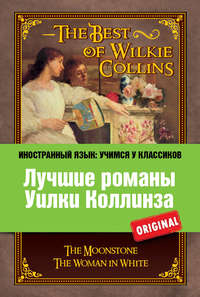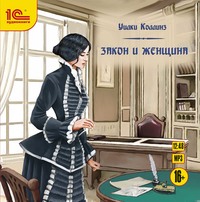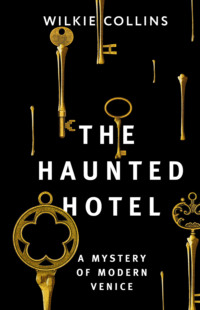
Полная версия
The Woman in White


THE WOMAN IN WHITE
Wilkie Collins

CONTENTS
Cover
Title Page
The First Epoch
The Story Begun by Walter Hartright
The Story Continued by Vincent Gilmore
The Story Continued by Marian Halcombe
The Second Epoch
The Story Continued by Marian Halcombe
The Story Continued by Frederick Fairlie, Esq.
The Story Continued by Eliza Michelson
The Story Continued in Several Narratives
I. The Narrative of Hester Pinhorn
II. The Narrative of The Doctor
III. The Narrative of Jane Gould
IV. The Narrative of The Tombstone
V. The Narrative of Walter Hartright
The Third Epoch
The Story Continued by Walter Hartright
The Story Continued by Mrs. Catherick
The Story Continued by Walter Hartright
The Story Continued by Isidor, Ottavio, Baldassare Fosco
The Story Concluded by Walter Hartright
Classic Literature: Words and Phrases Adapted from the Collins English Dictionary
About the Author
History of Collins
Copyright
About the Publisher
The Story Begun by Walter Hartright (of Clement’s Inn, Teacher of Drawing)
I
This is the story of what a Woman’s patience can endure, and what a Man’s resolution can achieve.
If the machinery of the Law could be depended on to fathom every case of suspicion, and to conduct every process of inquiry, with moderate assistance only from the lubricating influences of oil of gold, the events which fill these pages might have claimed their share of the public attention in a Court of Justice.
But the Law is still, in certain inevitable cases, the pre-engaged servant of the long purse; and the story is left to be told, for the first time, in this place. As the Judge might once have heard it, so the Reader shall hear it now. No circumstance of importance, from the beginning to the end of the disclosure, shall be related on hearsay evidence. When the writer of these introductory lines (Walter Hartright by name) happens to be more closely connected than others with the incidents to be recorded, he will describe them in his own person. When his experience fails, he will retire from the position of narrator; and his task will be continued, from the point at which he has left it off, by other persons who can speak to the circumstances under notice from their own knowledge, just as clearly and positively as he has spoken before them.
Thus, the story here presented will be told by more than one pen, as the story of an offence against the laws is told in Court by more than one witness—with the same object, in both cases, to present the truth always in its most direct and most intelligible aspect; and to trace the course of one complete series of events, by making the persons who have been most closely connected with them, at each successive stage, relate their own experience, word for word.
Let Walter Hartright, teacher of drawing, aged twenty-eight years, be heard first.
II
It was the last day of July. The long hot summer was drawing to a close; and we, the weary pilgrims of the London pavement, were beginning to think of the cloud-shadows on the corn-fields, and the autumn breezes on the sea-shore.
For my own poor part, the fading summer left me out of health, out of spirits, and, if the truth must be told, out of money as well. During the past year I had not managed my professional resources as carefully as usual; and my extravagance now limited me to the prospect of spending the autumn economically between my mother’s cottage at Hampstead and my own chambers in town.
The evening, I remember, was still and cloudy; the London air was at its heaviest; the distant hum of the street-traffic was at its faintest; the small pulse of the life within me, and the great heart of the city around me, seemed to be sinking in unison, languidly and more languidly, with the sinking sun. I roused myself from the book which I was dreaming over rather than reading, and left my chambers to meet the cool night air in the suburbs. It was one of the two evenings in every week which I was accustomed to spend with my mother and my sister. So I turned my steps northward in the direction of Hampstead.
Events which I have yet to relate make it necessary to mention in this place that my father had been dead some years at the period of which I am now writing; and that my sister Sarah and I were the sole survivors of a family of five children. My father was a drawing-master before me. His exertions had made him highly successful in his profession; and his affectionate anxiety to provide for the future of those who were dependent on his labours had impelled him, from the time of his marriage, to devote to the insuring of his life a much larger portion of his income than most men consider it necessary to set aside for that purpose. Thanks to his admirable prudence and self-denial my mother and sister were left, after his death, as independent of the world as they had been during his lifetime. I succeeded to his connection, and had every reason to feel grateful for the prospect that awaited me at my starting in life.
The quiet twilight was still trembling on the topmost ridges of the heath; and the view of London below me had sunk into a black gulf in the shadow of the cloudy night, when I stood before the gate of my mother’s cottage. I had hardly rung the bell before the house door was opened violently; my worthy Italian friend, Professor Pesca, appeared in the servant’s place; and darted out joyously to receive me, with a shrill foreign parody on an English cheer.
On his own account, and, I must be allowed to add, on mine also, the Professor merits the honour of a formal introduction. Accident has made him the starting-point of the strange family story which it is the purpose of these pages to unfold.
I had first become acquainted with my Italian friend by meeting him at certain great houses where he taught his own language and I taught drawing. All I then knew of the history of his life was, that he had once held a situation in the University of Padua; that he had left Italy for political reasons (the nature of which he uniformly declined to mention to any one); and that he had been for many years respectably established in London as a teacher of languages.
Without being actually a dwarf—for he was perfectly well proportioned from head to foot—Pesca was, I think, the smallest human being I ever saw out of a show-room. Remarkable anywhere by his personal appearance, he was still further distinguished among the rank and file of mankind by the harmless eccentricity of his character. The ruling idea of his life appeared to be that he was bound to show his gratitude to the country which had afforded him an asylum and a means of subsistence by doing his utmost to turn himself into an Englishman. Not content with paying the nation in general the compliment of invariably carrying an umbrella, and invariably wearing gaiters and a white hat, the Professor further aspired to become an Englishman in his habits and amusements, as well as in his personal appearance. Finding us distinguished, as a nation, by our love of athletic exercises, the little man, in the innocence of his heart, devoted himself impromptu to all our English sports and pastimes whenever he had the opportunity of joining them; firmly persuaded that he could adopt our national amusements of the field by an effort of will precisely as he had adopted our national gaiters and our national white hat.
I had seen him risk his limbs blindly at a fox-hunt and in a cricket-field; and soon afterwards I saw him risk his life, just as blindly, in the sea at Brighton.
We had met there accidentally, and were bathing together. If we had been engaged in any exercise peculiar to my own nation I should, of course, have looked after Pesca carefully; but as foreigners are generally quite as well able to take care of themselves in the water as Englishmen, it never occurred to me that the art of swimming might merely add one more to the list of manly exercises which the Professor believed that he could learn impromptu. Soon after we had both struck out from shore, I stopped, finding my friend did not gain on me, and turned round to look for him. To my horror and amazement, I saw nothing between me and the beach but two little white arms which struggled for an instant above the surface of the water, and then disappeared from view. When I dived for him, the poor little man was lying quietly coiled up at the bottom, in a hollow of shingle, looking by many degrees smaller than I had ever seen him look before. During the few minutes that elapsed while I was taking him in, the air revived him, and he ascended the steps of the machine with my assistance. With the partial recovery of his animation came the return of his wonderful delusion on the subject of swimming. As soon as his chattering teeth would let him speak, he smiled vacantly, and said he thought it must have been the Cramp.
When he had thoroughly recovered himself, and had joined me on the beach, his warm Southern nature broke through all artificial English restraints in a moment. He overwhelmed me with the wildest expressions of affection—exclaimed passionately, in his exaggerated Italian way, that he would hold his life henceforth at my disposal—and declared that he should never be happy again until he had found an opportunity of proving his gratitude by rendering me some service which I might remember, on my side, to the end of my days.
I did my best to stop the torrent of his tears and protestations by persisting in treating the whole adventure as a good subject for a joke; and succeeded at last, as I imagined, in lessening Pesca’s overwhelming sense of obligation to me. Little did I think then—little did I think afterwards when our pleasant holiday had drawn to an end—that the opportunity of serving me for which my grateful companion so ardently longed was soon to come; that he was eagerly to seize it on the instant; and that by so doing he was to turn the whole current of my existence into a new channel, and to alter me to myself almost past recognition.
Yet so it was. If I had not dived for Professor Pesca when he lay under water on his shingle bed, I should in all human probability never have been connected with the story which these pages will relate—I should never, perhaps, have heard even the name of the woman who has lived in all my thoughts, who has possessed herself of all my energies, who has become the one guiding influence that now directs the purpose of my life.
III
Pesca’s face and manner, on the evening when we confronted each other at my mother’s gate, were more than sufficient to inform me that something extraordinary had happened. It was quite useless, however, to ask him for an immediate explanation. I could only conjecture, while he was dragging me in by both hands, that (knowing my habits) he had come to the cottage to make sure of meeting me that night, and that he had some news to tell of an unusually agreeable kind.
We both bounced into the parlour in a highly abrupt and undignified manner. My mother sat by the open window laughing and fanning herself. Pesca was one of her especial favourites and his wildest eccentricities were always pardonable in her eyes. Poor dear soul! from the first moment when she found out that the little Professor was deeply and gratefully attached to her son, she opened her heart to him unreservedly, and took all his puzzling foreign peculiarities for granted, without so much as attempting to understand any one of them.
My sister Sarah, with all the advantages of youth, was, strangely enough, less pliable. She did full justice to Pesca’s excellent qualities of heart; but she could not accept him implicitly, as my mother accepted him, for my sake. Her insular notions of propriety rose in perpetual revolt against Pesca’s constitutional contempt for appearances; and she was always more or less undisguisedly astonished at her mother’s familiarity with the eccentric little foreigner. I have observed, not only in my sister’s case, but in the instances of others, that we of the young generation are nothing like so hearty and so impulsive as some of our elders. I constantly see old people flushed and excited by the prospect of some anticipated pleasure which altogether fails to ruffle the tranquillity of their serene grandchildren. Are we, I wonder, quite such genuine boys and girls now as our seniors were in their time? Has the great advance in education taken rather too long a stride; and are we in these modern days, just the least trifle in the world too well brought up?
Without attempting to answer those questions decisively, I may at least record that I never saw my mother and my sister together in Pesca’s society, without finding my mother much the younger woman of the two. On this occasion, for example, while the old lady was laughing heartily over the boyish manner in which we tumbled into the parlour, Sarah was perturbedly picking up the broken pieces of a teacup, which the Professor had knocked off the table in his precipitate advance to meet me at the door.
“I don’t know what would have happened, Walter,” said my mother, “if you had delayed much longer. Pesca has been half mad with impatience, and I have been half mad with curiosity. The Professor has brought some wonderful news with him, in which he says you are concerned; and he has cruelly refused to give us the smallest hint of it till his friend Walter appeared.”
“Very provoking: it spoils the Set,” murmured Sarah to herself, mournfully absorbed over the ruins of the broken cup.
While these words were being spoken, Pesca, happily and fussily unconscious of the irreparable wrong which the crockery had suffered at his hands, was dragging a large arm-chair to the opposite end of the room, so as to command us all three, in the character of a public speaker addressing an audience. Having turned the chair with its back towards us, he jumped into it on his knees, and excitedly addressed his small congregation of three from an impromptu pulpit.
“Now, my good dears,” began Pesca (who always said “good dears” when he meant “worthy friends”), “listen to me. The time has come—I recite my good news—I speak at last.”
“Hear, hear!” said my mother, humouring the joke.
“The next thing he will break, mamma,” whispered Sarah, “will be the back of the best arm-chair.”
“I go back into my life, and I address myself to the noblest of created beings,” continued Pesca, vehemently apostrophising my unworthy self over the top rail of the chair. “Who found me dead at the bottom of the sea (through Cramp); and who pulled me up to the top; and what did I say when I got into my own life and my own clothes again?”
“Much more than was at all necessary,” I answered as doggedly as possible; for the least encouragement in connection with this subject invariably let loose the Professor’s emotions in a flood of tears.
“I said,” persisted Pesca, “that my life belonged to my dear friend, Walter, for the rest of my days—and so it does. I said that I should never be happy again till I had found the opportunity of doing a good Something for Walter—and I have never been contented with myself till this most blessed day. Now,” cried the enthusiastic little man at the top of his voice, “the overflowing happiness bursts out of me at every pore of my skin, like a perspiration; for on my faith, and soul, and honour, the something is done at last, and the only word to say now is—Right-all-right!”
It may be necessary to explain here that Pesca prided himself on being a perfect Englishman in his language, as well as in his dress, manners, and amusements. Having picked up a few of our most familiar colloquial expressions, he scattered them about over his conversation whenever they happened to occur to him, turning them, in his high relish for their sound and his general ignorance of their sense, into compound words and repetitions of his own, and always running them into each other, as if they consisted of one long syllable.
“Among the fine London Houses where I teach the language of my native country,” said the Professor, rushing into his long-deferred explanation without another word of preface, “there is one, mighty fine, in the big place called Portland. You all know where that is? Yes, yes—course-of-course. The fine house, my good dears, has got inside it a fine family. A Mamma, fair and fat; three young Misses, fair and fat; two young Misters, fair and fat; and a Papa, the fairest and the fattest of all, who is a mighty merchant, up to his eyes in gold—a fine man once, but seeing that he has got a naked head and two chins, fine no longer at the present time. Now mind! I teach the sublime Dante to the young Misses, and ah!—my-soul-bless-my-soul!—it is not in human language to say how the sublime Dante puzzles the pretty heads of all three! No matter—all in good time—and the more lessons the better for me. Now mind! Imagine to yourselves that I am teaching the young Misses to-day, as usual. We are all four of us down together in the Hell of Dante. At the Seventh Circle—but no matter for that: all the Circles are alike to the three young Misses, fair and fat,—at the Seventh Circle, nevertheless, my pupils are sticking fast; and I, to set them going again, recite, explain, and blow myself up red-hot with useless enthusiasm, when—a creak of boots in the passage outside, and in comes the golden Papa, the mighty merchant with the naked head and the two chins.—Ha! my good dears, I am closer than you think for to the business, now. Have you been patient so far? or have you said to yourselves, ‘Deuce-what-the-deuce! Pesca is long-winded to-night?’”
We declared that we were deeply interested. The Professor went on:
“In his hand, the golden Papa has a letter; and after he has made his excuse for disturbing us in our Infernal Region with the common mortal Business of the house, he addresses himself to the three young Misses, and begins, as you English begin everything in this blessed world that you have to say, with a great O. ‘O, my dears,’ says the mighty merchant, ‘I have got here a letter from my friend, Mr.—’(the name has slipped out of my mind; but no matter; we shall come back to that; yes, yes—right-all-right). So the Papa says, ‘I have got a letter from my friend, the Mister; and he wants a recommend from me, of a drawing-master, to go down to his house in the country.’ My-soul-bless-my-soul! when I heard the golden Papa say those words, if I had been big enough to reach up to him, I should have put my arms round his neck, and pressed him to my bosom in a long and grateful hug! As it was, I only bounced upon my chair. My seat was on thorns, and my soul was on fire to speak but I held my tongue, and let Papa go on. ‘Perhaps you know,’ says this good man of money, twiddling his friend’s letter this way and that, in his golden fingers and thumbs, ‘perhaps you know, my dears, of a drawing-master that I can recommend?’ The three young Misses all look at each other, and then say (with the indispensable great O to begin) ‘O, dear no, Papa! But here is Mr. Pesca.’ At the mention of myself I can hold no longer—the thought of you, my good dears, mounts like blood to my head—I start from my seat, as if a spike had grown up from the ground through the bottom of my chair—I address myself to the mighty merchant, and I say (English phrase) ‘Dear sir, I have the man! The first and foremost drawing-master of the world! Recommend him by the post to-night, and send him off, bag and baggage (English phrase again—ha!), send him off, bag and baggage, by the train to-morrow!’ ‘Stop, stop,’ says Papa; ‘is he a foreigner, or an Englishman?’ ‘English to the bone of his back,’ I answer. ‘Respectable?’ says Papa. ‘Sir,’ I say (for this last question of his outrages me, and I have done being familiar with him—) ‘Sir! the immortal fire of genius burns in this Englishman’s bosom, and, what is more, his father had it before him!’ ‘Never mind,’ says the golden barbarian of a Papa, ‘never mind about his genius, Mr. Pesca. We don’t want genius in this country, unless it is accompanied by respectability—and then we are very glad to have it, very glad indeed. Can your friend produce testimonials—letters that speak to his character?’ I wave my hand negligently. ‘Letters?’ I say. ‘Ha! my-soul-bless-my-soul! I should think so, indeed! Volumes of letters and portfolios of testimonials, if you like!’ ‘One or two will do,’ says this man of phlegm and money. ‘Let him send them to me, with his name and address. And—stop, stop, Mr. Pesca—before you go to your friend, you had better take a note.’ ‘Bank-note!’ I say, indignantly. ‘No bank-note, if you please, till my brave Englishman has earned it first.’ ‘Bank-note!’ says Papa, in a great surprise, ‘who talked of bank-note? I mean a note of the terms—a memorandum of what he is expected to do. Go on with your lesson, Mr. Pesca, and I will give you the necessary extract from my friend’s letter.’ Down sits the man of merchandise and money to his pen, ink, and paper; and down I go once again into the Hell of Dante, with my three young Misses after me. In ten minutes’ time the note is written, and the boots of Papa are creaking themselves away in the passage outside. From that moment, on my faith, and soul, and honour, I know nothing more! The glorious thought that I have caught my opportunity at last, and that my grateful service for my dearest friend in the world is as good as done already, flies up into my head and makes me drunk. How I pull my young Misses and myself out of our Infernal Region again, how my other business is done afterwards, how my little bit of dinner slides itself down my throat, I know no more than a man in the moon. Enough for me, that here I am, with the mighty merchant’s note in my hand, as large as life, as hot as fire, and as happy as a king! Ha! ha! ha! right-right-right-all-right!” Here the Professor waved the memorandum of terms over his head, and ended his long and voluble narrative with his shrill Italian parody on an English cheer.
My mother rose the moment he had done, with flushed cheeks and brightened eyes. She caught the little man warmly by both hands.
“My dear, good Pesca,” she said, “I never doubted your true affection for Walter—but I am more than ever persuaded of it now!”
“I am sure we are very much obliged to Professor Pesca, for Walter’s sake,” added Sarah. She half rose, while she spoke, as if to approach the arm-chair, in her turn; but, observing that Pesca was rapturously kissing my mother’s hands, looked serious, and resumed her seat. “If the familiar little man treats my mother in that way, how will he treat me?” Faces sometimes tell truth; and that was unquestionably the thought in Sarah’s mind, as she sat down again.
Although I myself was gratefully sensible of the kindness of Pesca’s motives, my spirits were hardly so much elevated as they ought to have been by the prospect of future employment now placed before me. When the Professor had quite done with my mother’s hand, and when I had warmly thanked him for his interference on my behalf, I asked to be allowed to look at the note of terms which his respectable patron had drawn up for my inspection.
Pesca handed me the paper, with a triumphant flourish of the hand.









